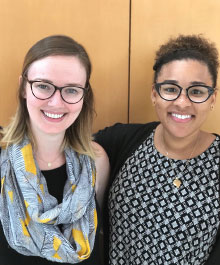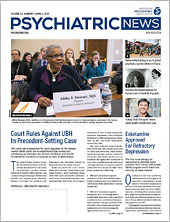One month of working in the Department of Psychiatry at Komfo Anokye Teaching Hospital (KATH) in Kumasi, Ghana, didn’t feel like nearly enough time for University of Michigan child psychology fellows Heidi Burns, M.D., and Nakita Natala, M.D.
While at KATH in November 2017, Burns and Natala had given lectures, observed clinic visits, and formed connections with colleagues, but they wanted to do more. Before they boarded a plane home, they submitted applications to the Fogarty Global Health Fellowship Program, and having been selected to participate, they embarked last August on year-long projects with KATH. The fellowship program, sponsored by the National Institutes of Health’s Fogarty International Center in partnership with several institutes of the National Institutes of Health, offers clinical research training for postdoctorate trainees and doctoral students in the health professions in low- and middle-income countries.
Burns’s project focuses on identifying suicide trends and investigates frontline health professional attitudes toward suicide and suicide prevention in Ghana. Natala’s project focuses on children with developmental disabilities. Research in these areas is a critical need in Ghana, where, according to the World Health Organization (WHO), only 2.8 percent of the 2.4 million people with mental illnesses receive treatment because of an extreme shortage of psychiatrists.
“We’ve been told that there are an estimated 25 to 30 psychiatrists in Ghana, which is about one per 1 million residents,” said Burns, noting that child and adolescent psychiatry is not a subspecialty there.
Midway through their projects, both Burns and Natala have developed a deep appreciation for forging partnerships with their Ghanaian counterparts.
“Your relationships are integral to your success in global health work. They provide you with emotional and scholarly support that you need to thrive during a year abroad working in a new culture,” Burns said. “My colleagues have not only helped guide me through potential cross-cultural mishaps at work but have also invited me into their homes and helped foster my passion for working with this community.”
Natala noted one such potential mishap.
“As an outsider, it is culturally inappropriate to come in, take data, and leave. Therefore, I am trying to be thoughtful about how I am collecting data, forming relationships, and the impact I am having on the people and communities I interact with,” Natala said. “My Ghanaian colleagues have been instrumental in helping me navigate these cultural barriers and approach various directors of clinics and facilities.”
Last November, Burns and Natala made presentations that were well received at the World Psychiatric Association Regional Congress in Addis Ababa, Ethiopia. Burns presented preliminary findings on her research project.
“Previous studies have found that attitudes toward mental illness in Ghana are often influenced by factors including religion, traditional views, and laws criminalizing suicidal behavior,” Burns said. “[My] study hopes to improve the understanding of health care providers’ knowledge, attitudes, and beliefs about suicide and suicide prevention in an effort to build a foundation of knowledge that can be used to create suicide prevention programs that are specific to Ghana.”
Natala presented a poster on the University of Michigan and KATH Teaching Hospital Child Psychiatry Collaboration and participated in a separate talk about autism in Ghana.
“Clinicians here in Kumasi caring for children with neurodevelopmental disorders often have limited knowledge about what resources do exist and are too overwhelmed with clinical duties to go out and discover resources on their own,” Natala said. “My hope is to bridge this gap by providing this information across different settings.”
Both Burns and Natala encourage psychiatrists to seek out opportunities in global health in low-resource areas.
“This year has been a great opportunity to learn about a new culture, appreciate how people live differently, and creatively make the best out of life even when they have fewer resources,” Natala said.
“One of the most exciting aspects of this experience is that it allows you to pause your fast-paced life and invest an entire year learning a new skill that you will carry with you for your entire career,” said Burns. ■

